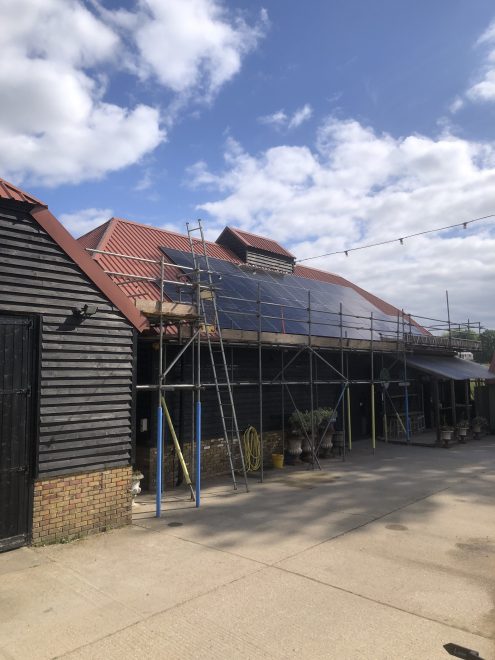Vine-tastic! South Downs winemakers raise a toast to climate action
June 19, 2025

Vineyards across the South Downs are embracing climate action to produce gorgeous glasses of fizz more sustainably.
From solar panels, to energy-efficient equipment, rainwater harvesting and less fertilisers, producers in one of the UK’s winemaking hubs are finding innovative ways to do their bit for the planet.
Seven vineyards in and around the South Downs are now benefitting from climate action grants. The funding has come from West Sussex local authorities – comprising Arun, Chichester, Horsham and Mid Sussex District Councils, as well as West Sussex County Council and the South Downs National Park Authority – while the South Downs Trust, the official charity for the National Park, has been administering the fund.
As English Wine Week approaches (21 June to 29 June), extra grant funding is being made available to help vineyards get involved in climate action.
It comes as the South Downs National Park is one of the fastest-growing wine regions in Europe, with a 90 per cent increase in vineyard coverage over the past decade and an average of five new vineyards planted every year.
The National Park’s sun-soaked slopes and chalky soils, reminiscent of northern France, are perfect for growing grapes, particularly to make sumptuous sparkling wines that rival some of the best in the world in quality, complexity and taste.
 Chris Hannon, Sustainable Business Lead for the South Downs National Park, said: “The South Downs has become one of Britain’s premier winemaking regions and it’s a sector that is growing quickly, in part because of climate change and warmer summers.
Chris Hannon, Sustainable Business Lead for the South Downs National Park, said: “The South Downs has become one of Britain’s premier winemaking regions and it’s a sector that is growing quickly, in part because of climate change and warmer summers.
“It’s important that viticulture grows in an environmentally-sustainable way and that’s where this funding can really help.
“It’s been wonderful working closely with our forward-thinking local authority partners to support producers and wineries, who are really keen to incorporate sustainability and nature-based solutions to create these wonderful wines.”
Among the grant beneficiaries so far have been:
The Rowfant Vineyard, near Crawley – 2,500-litre rainwater harvesting system and installation of an off-grid solar kit.
Kinsbrook Vineyards, near Pulborough – A new defoliator to remove excess leaves from the vines with the aim to naturally reduce fungi.
Tinwood Estate, near Chichester – Cover cropping in the vineyard alleyways to improve soil health and reduce the need for fertilisers.
Wiston Estate Winery – Installation of a more energy-efficient air compressor (used to crush grapes) and purchase of re-useable Velcro straps to replace plastic pallet wrap for pallet wine storage.
Nutbourne Vineyards, near Pulborough – Roof-mounted solar energy system to include panels, inverter, batteries, electrical power grid converter, and power diverter as part of aim to become a carbon-neutral business.
Roebuck Estates – Little Brockwood Farm, near Petworth – Installation of biodiversity pond to help wildlife and aid the flow of cold air away from the vines.
The Ghost at The Feast, Chichester – New equipment to allow the business to run a closed-loop bottling system on-site including a steamer, rinser and bottle trees. They are aiming to produce the first wine bottled within Chichester City walls.
Art Tukker, who runs Tinwood Estate and is a second-generation farmer who took over the estate in 2006. said: “The grant funding to buy seed – which directly improved the health of our soils and the biodiversity of our farm – was invaluable. The insects, bees and other species feeding on the flourishing flowers in between our vines is wonderful to see!”
 Kate O’Norum, who runs The Ghost At The Feast, said: “This grant is an absolute game changer for our on-site micro winery. Packaging and transportation account for 40 per cent of a winery’s GHG emissions and the majority of that is the production and transportation of glass bottles. Our new closed-loop bottling system, which re-uses bottles from the onsite wine bar, will enable us to cut these emissions completely, and reduce our current recycling costs and emissions, getting us closer to our sustainability goals.”
Kate O’Norum, who runs The Ghost At The Feast, said: “This grant is an absolute game changer for our on-site micro winery. Packaging and transportation account for 40 per cent of a winery’s GHG emissions and the majority of that is the production and transportation of glass bottles. Our new closed-loop bottling system, which re-uses bottles from the onsite wine bar, will enable us to cut these emissions completely, and reduce our current recycling costs and emissions, getting us closer to our sustainability goals.”
Michael Kennedy, CEO of Roebuck Estates, said: “We have always had the environment at the heart of Roebuck Estates, in fact we take our name from the roe deer that roam wild near our sites. In 2023, we took the decision to recruit an ecologist into our viticulture team to really help us drive our focus on improving soil health and encouraging biodiversity across our six sites. The climate action grant has allowed us to bring forward our plans to build a biodiversity pond in one of our sites. With the planting of a number of native plant species, we expect to encourage a whole host of insect, mammal and reptile life back into our vineyard, at a time when nature has been sorely challenged across the English countryside.”

Some £50,000 has been invested in grants across these projects. A limited funding pot remains and producers who are interested in applying can contact Miriam Swan at grants@southdowns.gov.uk Funding is subject to a grants panel and open to vineyards, wineries and/or grape distillers within the administrative boundary of Arun, Chichester, Horsham or Mid Sussex District Councils.
- There are well over 50 vineyards and 11 wineries in the National Park, employing more than 350 people, attracting approximately 33,000 visitors a year and contributing directly around £24.5 million to the local economy and around £54m to the wider economy
